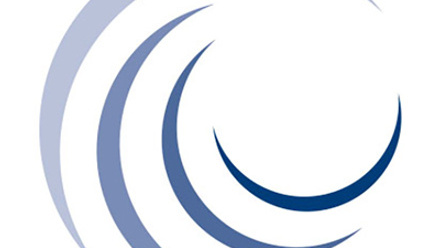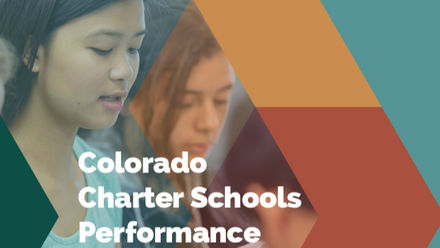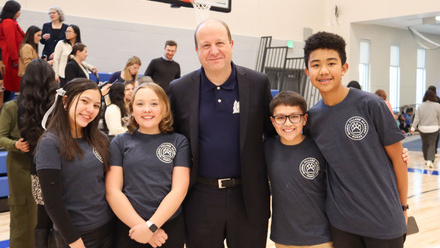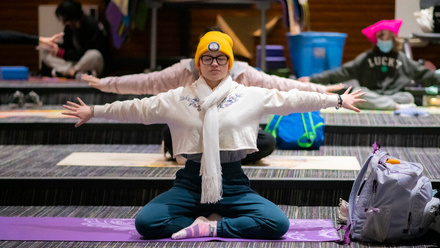Charter School Changemakers Raise Their Voices on Capitol Hill
NAPCS
National Alliance for Public Charter Schools
May 15, 2024
Today, seven passionate charter school leaders convened on Capitol Hill to participate in a panel discussion focused on advocating for public education. Hosted by the National Alliance for Public Charter Schools, the panel brought together the 2024 Charter School Changemakers, individuals who are making an exceptional difference in their schools and communities, and who go above and beyond to shape students’ lives for the better. These seven individuals are unique in their communities, but together, represent a unified force for creating more high-quality public education options for families.
The 2024 Charter School Changemakers are:
- Daniyal Hussain, high school senior at Cottonwood Classical Preparatory School in New Mexico, and panel moderator
- Zak Dominello, executive director at Ricardo Flores Magon Academy in Colorado
- Dr. Chris Her-Xiong, founder and executive director of Hmong American Peace Academy in Wisconsin
- Eric Pettigrew, former state lawmaker and advocate in Washington state
- Jametrice McAdams, parent from Empower Community School in Alabama and a former ELA educator
- Julia Rivera-Tapia, parent and administrator at J. Paul Taylor Academy in New Mexico
- Cheryl Stahle, academic administrator at West Virginia Virtual Academy
The Changemakers shared insights, experiences, and strategies aimed at bolstering support for charter schools and advancing the cause of public education. Their collective expertise spanned areas such as educational policy, parent and community engagement, curriculum development, and school administration.
"Today's panel was an inspiring demonstration of the commitment these advocates have to ensuring all students have access to quality education," said Eric Paisner, Acting CEO of the National Alliance for Public Charter Schools.
The Changemakers travelled to Capitol Hill during National Charter Schools Week, an annual celebration of these unique public schools and their impact on communities across the country. This year’s theme is Raise Your Voice and the National Alliance is celebrating by honoring the more than 250,000 dedicated teachers at 8,000 schools, thousands of lawmakers and advocates, and nearly 4 million students who are part of the charter school community. This week-long celebration encourages everyone to raise their voice for high-quality public education options for all children.
Among the topics discussed were the importance of fostering collaboration between public charter schools and district public schools, advocating for equitable funding mechanisms, and empowering parents and communities to be active participants in shaping the educational landscape.
Julia Rivera-Tapia: “Having spent many years as an educator in charter schools, I can vouch for the benefits of being in an environment that invests in the growth of its staff and provides individualized attention to all students. Every charter school is a unique puzzle piece that fits the needs of its students and families, and it is crucial to advocate for each one of them.”
Jametrice McAdams: “Like most parents, I believe that all educational systems SHOULD prepare our children to enter careers and be productive members of society. Unfortunately, this is not always the case for kids in my community. However, the charter school model has been a vehicle for change and opportunity. These models are what have me most excited about the future of public education. I’m excited to advocate with other parents who are invested in ensuring that their child’s charter school is a success for years to come. My charter school has given me renewed hope in the public education system.”
Eric Pettigrew: “As a member of the Washington State House, I became an advocate for charter public schools—which I believe provide a great complement to traditional public schools, especially for students of color. This past legislative session, as my former colleagues considered what policies to advance, I urged them to ensure that all students across Washington state have access to a public school that meets their needs.”
Daniyal Hussain: “Advocating for charter schools means I am raising my voice for something I believe is truly important for my community. Charter schools like Cottonwood Classical often offer more opportunities than other schools, like the IB curriculum. I believe all students should be able to take something like this and should not be held back because it is too expensive, or their school does not offer it. Raising my voice for charter schools means showing the need for these unique public schools and putting more effort into supporting them.”
Dr. Chris Her-Xiong: “To raise my voice for charter schools is to provide opportunities for the underserved, underrepresented, and low-income populations in my community. The children in my community deserve a quality education so they are equipped with the skillsets and mindsets to go to and through college and pursue a career of their choosing. Hmong American Peace Academy, like other high-performing charter schools, enables giant leaps forward from one generation to the next. I am most excited about the future of public education and the opportunities afforded to our young people because the power of education is transformational.”
Cheryl Stahle: “Raising our voice for charter schools means championing and advocating for educational innovation, choice, and opportunity. It means standing up for families who seek alternatives to traditional public schools and ensuring that every child has access to high-quality education regardless of their zip code or background.”
Zak Dominello: “Our public education system is due for a paradigm shift to meet the needs of all unique learners. Not all students fit into the model of their closest district or public charter school, and by providing multiple options with differing models and philosophies, we can do what is best for all children. Seeing a shift to support all students will require a collective voice to make the longstanding change. The future of education consists of the traits I see in my students daily: curiosity, voice, empathy, compassion, and skills like bilingualism and social advocacy. I am excited to raise my voice for a future of unity toward a common goal: accessible and equitable education for all students.”
Photos and videos from the panel discussion are available for media use. Journalists, educators, policymakers, and advocates are encouraged to utilize these resources to further amplify the dialogue around public education and charter school advocacy.
About Public Charter Schools
Public charter schools are independent, public, and tuition-free schools that are given the freedom to be more innovative while being held accountable for advancing student achievement. Since 2010, many research studies have found that students in charter schools do better in school than their traditional school peers. For example, one study by the Center for Research on Education Outcomes at Stanford University found that charter schools do a better job teaching students from low-income families, students of color, and students who are still learning English than traditional schools. Separate studies by the Center on Reinventing Public Education and Mathematica Policy Research have found that charter school students are more likely to graduate from high school, go on to college, stay in college and have higher earnings in early adulthood.
About the National Alliance for Public Charter Schools
The National Alliance for Public Charter Schools is the leading national nonprofit organization committed to advancing the public charter school movement. Our mission is to lead public education to unprecedented levels of academic achievement by fostering a strong charter sector. For more information, please visit www.publiccharters.org.





